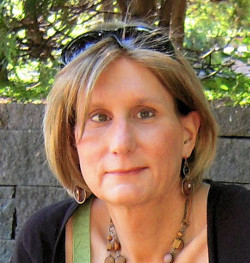BY AJ TRAGER

DETROIT – West Michigan activist and trans advocate Amy Hunter has joined the ACLU of Michigan and begun her work with the Trans Advocacy Project, or Advocacy University.
Hunter has done advocacy work since 2008; she has helped redraft Kalamazoo's nondiscrimination ordinance before it went into referendum, worked on the One Kalamazoo campaign and is the current chair of Kalamazoo Alliance for Equality.
Hunter began speaking with the ACLU in late summer of 2014 just before an amendment to the Elliott-Larsen Civil Rights Act, which would have added sexual orientation and gender identity to a list of Michigan's protected classes, failed in the state Legislature. Since then she has worked closely with Legislative Director of the ACLU of Michigan, Shelli Weisberg, to develop a program that will build an infrastructure and build stronger trans leadership in the state.
"Shelli saw me as someone who has had experience and holds a big picture view of the landscape around trans issues," said Hunter, "that I seem like a logical person to kick this thing off. Shelli and I saw a need and we've since been really good friends."
The Trans Advocacy Project or Advocacy University will bring together trans men and women from across the state who will participate in six skill building sessions. Each session will teach them how to utilize story telling and voice building skills to tell their story in a compelling way with the goal of educating the public sphere by speaking effectively on trans issues to coworkers, friends, community members, policy makers and the media.
In June of this year, Hunter and the ACLU held a series of four meetings with trans leaders across the state including individuals from the Kalamazoo Gay and Lesbian Resource Center, The Network in Grand Rapids, the tri-cities area and with Lilianna Reyes, youth director at Affirmations.
"Another key component was bringing together these groups that were serving the community that had trans outreach. They engaged membership and had folks that utilize their services already. That was our initial poll, pitching the idea to trans folks and allies," Hunter said.
The Advocacy University sessions will begin in September and continue through February 2016 with an initial poll of about 30 people. She plans to have media representatives present to talk about how to effectively tell a life story as well as representatives speaking towards political strategy and getting trans persons to advocate on behalf of the trans community. Hunter hopes that the discussions will create a strong sense of community and that they will develop new ways to talk about nondiscrimination protections and why they are so important to the trans community.
"It is imperative that trans people be at the table talking about their lives and how they are impacted by lack of healthcare and how trans women of color are at the intersection of blackness and transness. They're people of color and trans, and they are women. They experience gender discrimination, trans discrimination and racial discrimination," Hunter said. "That's how you change the narrative. The trans community is an easy community to demonize. That keeps us marginalized and dehumanized. We are a political football. And the only way to combat that is through representation and sharing personal stories."
There has been an unprecedented explosion of trans people in the media from Laverne Cox on "Orange is the New Black" to the recent coming out of Caitlyn Jenner. Hunter says this may allow the general public to find a level of familiarity with trans people, but they remain largely unaware of what being transgender means and what the trans community faces on a day-to-day basis.
"We've had enough response for Advocacy University that I'm hoping we will then scale more trainings and format them to be more open to the public and tailored to people who aren't as interested in public outreach on their own, but would still like to learn advocacy skills," Hunter said. "If we could do some corporate outreach, we can talk to folks in healthcare, talk to law enforcement in how to interact with the trans community; there is a myriad of ways that the trans community can and should be advocating for themselves that goes beyond law making."
Ten years ago, Hunter remembers how the media spoke of trans identities in a completely sensational manner and was constantly focused on the physicality of trans people. While there may be less and less of that now, and the media is more focused on substantive material, instances of misgendering continue to persist. Just recently, India Clarke, a 25-year-old trans woman of color, was killed in Tampa with local and state media organizations misgendering her in their reports.
However, even with the maltreatment from the media, Hunter still sees trans representation as a positive and emphasizes the importance of having those faces and stories visible to the public.
"I cannot emphasize enough that it represents a step into the mainstream for us. Which is where we need to go," Hunter said. "We still haven't reached equity for the trans community. There is a whole segment of stuff out there that you just don't hear about yet. I'd like to see folks talking about how trans women of color have some of the highest rates of HIV infection in the community. And a lot of that is driven by the fact that there isn't socio-economic equality for trans people of color and people of color. I'd like to have some real talk about sex work in the trans community. Let's talk about why people have to do sex work to survive. We have to be willing to talk about disparate treatment of trans people in the criminal justice system."










